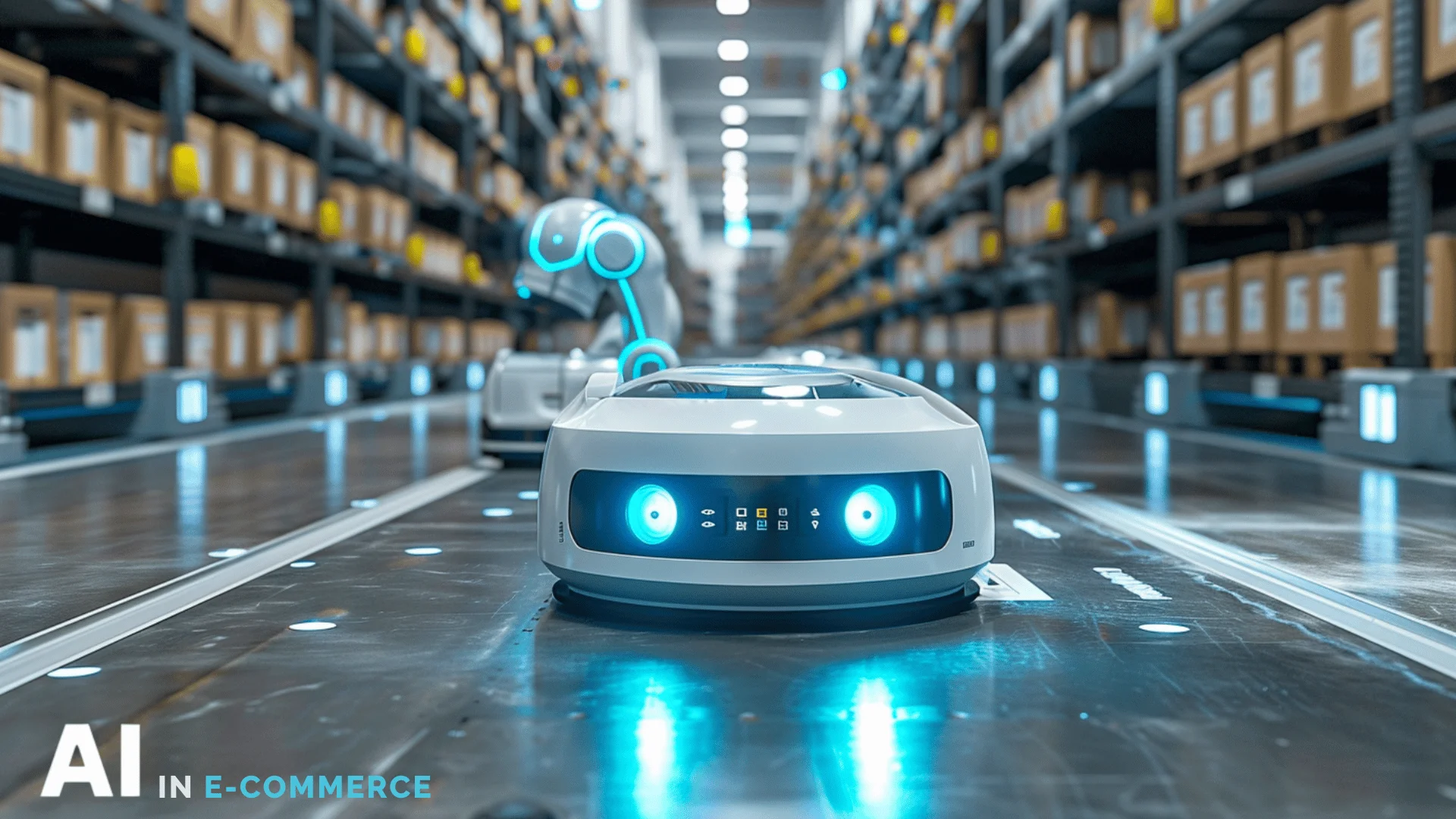Transforming AI in e-commerce: The Ways AI Transform Businesses in 2024

Artificial intelligence (AI) in e-commerce has revolutionized the industry, offering innovative solutions to enhance customer experiences and streamline business operations. Let’s explore the various aspects of AI in e-commerce and its significant impact on transforming businesses.
Our audience supports Ahcrypto. When you click on the links on our site, we may earn an affiliate commission at no extra cost to you. Learn More.
Key Takeaways
Introduction to AI e-commerce
Overview of-commerce and Artificial Intelligence
Artificial intelligence and e-commerce integration have reshaped the online shopping landscape by utilizing AI algorithms to personalize shopping experiences. From chatbots to virtual assistants, AI-powered tools have become integral in providing real-time solutions, such as product recommendations and personalized shopping experiences.
Stay Updated with the Latest Digital Marketing Tips!
Subscribe to our newsletter and receive our exclusive guide, “Top 10 Digital Marketing Strategies for Success,” straight to your inbox
Significance of AI e-commerce
The significance of AI in e-commerce cannot be understated. It plays a crucial role in improving customer satisfaction and driving business growth. AI technologies like machine learning and natural language processing empower retailers to optimize inventory management, enhance product recommendations, and boost conversion rates.
The growth of e-commerce businesses with AIE-commerce businesses that have implemented AI solutions has witnessed remarkable transformations in their operations, a benefit of AI that showcases its transformative potential. By leveraging AI for personalized customer interactions, conversational AI, and supply chain optimization, companies can enhance the shopping experience and increase customer loyalty.
Benefits of Using Artificial Intelligence in E-commerce
Implementing artificial intelligence (AI) in e-commerce brings many benefits to businesses. One significant advantage is the ability to personalize the shopping experience for each customer, enhancing customer satisfaction and increasing loyalty. AI tools, such as generative AI for product recommendations, empower retailers to offer personalized suggestions to shoppers based on their preferences and behaviors.
Types of AI Used in E-commerce

AI Tools for Personalization
Personalization is critical in e-commerce, and AI plays a crucial role in achieving this. By leveraging AI algorithms, online platforms can tailor the shopping journey for each shopper, offering relevant products and promotions in real-time. This personalized approach not only improves customer experience but also boosts conversion rates for businesses.
AI-Powered Inventory Management
AI-powered inventory management revolutionizes how e-commerce businesses handle stock levels and product availability. By utilizing AI for demand forecasting and real-time data analysis, retailers can optimize inventory management processes, reduce stockouts, and improve operational efficiency. This demonstrates the use cases of AI in optimizing backend operations.
Real-Time Data Processing E-commerce
Real-time data processing is crucial in e-commerce to make instant decisions and provide personalized experiences, an AI-powered capability. AI technologies enable businesses to analyze vast amounts of data in real time, extract valuable insights, and respond to customer needs swiftly. This capability enhances customer satisfaction and helps companies stay competitive in the dynamic e-commerce landscape.
Enhancing Customer Experience
Artificial intelligence (AI)is crucial in enhancing customer experience in e-commerce, as evidenced by the breadth of use cases, from chatbots to personalized recommendations. AI algorithms provide customized product recommendations to shoppers, increasing the likelihood of purchase. By analyzing shopper data and behavior, AI-powered systems can suggest relevant items, leading to higher conversion rates and improved customer satisfaction. This is a prime example of how AI can help personalize the shopping experience for potential customers.
AI for Product Recommendations
AI tools, such as generative AI, offer tailored product recommendations based on individual preferences and past interactions, an innovative way powered by AI to engage potential customers. This level of personalization enriches the shopping experience and boosts customer engagement and loyalty. By leveraging AI algorithms for product recommendations, retailers can effectively cater to each shopper’s unique needs and preferences, ultimately driving sales and customer retention.
Utilizing AI to Personalize the Shopper Journey
AI in commerce enables retailers to personalize the entire shopper journey, from product discovery to post-purchase interactions, enhancing how an e-commerce website engages with its users. By utilizing AI-powered chatbots and virtual assistants, businesses can offer personalized assistance and support to shoppers, improving their overall shopping experience. This customized approach fosters customer loyalty and increases the likelihood of repeat purchases, driving long-term growth for e-commerce businesses.
Improving Customer Service with AI
AI technology has revolutionized customer service in e-commerce by providing real-time and efficient support to shoppers. AI-powered assistants can address customer queries, offer product recommendations, and resolve issues promptly, improving customer satisfaction and loyalty. This is a clear indication of how AI can help in enhancing customer service. By leveraging AI for customer service, businesses can streamline their support processes, reduce response times, and deliver exceptional service that sets them apart in the competitive commerce landscape.
Transforming E-commerce Businesses

As artificial intelligence (AI) advances, its transformative impact on e-commerce businesses becomes increasingly evident. Successful examples of AI implementation in e-commerce companies showcase its effectiveness in streamlining operations and enhancing customer experiences. AI tools have revolutionized online retailers’ operations, from personalized product recommendations to efficient inventory management.
Successful Examples of AI iE-commerce Companies
Leading e-commerce companies have successfully integrated AI into their platforms, improving customer engagement and increasing sales. By utilizing AI algorithms for personalized marketing campaigns and chatbot assistance, these companies have enhanced the overall shopping experience for their customers, showing how AI makes a difference in customer interaction.
Benefits of Adopting AI in E-commerce
Adopting AI in e-commerce brings many benefits, including enhanced customer satisfaction, improved operational efficiency, and increased conversion rates. Businesses can create a seamless shopping journey that resonates with customers by leveraging AI tools for personalized recommendations and real-time data processing.
Future Perspectives: AI in the E-commerce Industry
The future of AI in the e-commerce industry looks promising, with continued advancements in AI technologies offering new opportunities for innovation and growth. From AI-powered virtual assistants to predictive analytics, the potential applications of AI in e-commerce are vast, paving the way for a more personalized and efficient online shopping experience.
How leading businesses harness AI tools for success
Leading businesses in the e-commerce sector leverage AI tools to drive success across various operations. By utilizing AI for customer interactions, inventory management, and personalized recommendations, these businesses set themselves apart in a competitive market and continuously strive for excellence in customer service and satisfaction.
Conclusion
In conclusion, integrating AI in e-commerce is not just a trend but a substantial evolution reshaping the retail landscape. By harnessing the power of artificial intelligence, businesses can offer personalized shopping experiences, streamline operations, and enhance customer satisfaction.
The deployment of AI tools, from chatbots to AI-powered recommendations, transforms how businesses interact with customers, making every digital interaction more efficient, insightful, and personalized. As e-commerce continues to evolve, the role of AI will undoubtedly expand, providing innovative solutions that drive business growth, improve customer engagement, and set new standards in the competitive online marketplace.
Embracing AI is no longer optional but essential for e-commerce businesses aiming to stay ahead in the digital era, ensuring they leverage the full potential of this transformative technology to revolutionize their business operations and customer relations.
Keep updated on all of our latest tips here.
FAQ

Scott Evans
Hey there, I’m Scott Evans, your friendly guide at AhCrypto! I’m all about breaking down complex SaaS, AI, and tech topics into digestible insights. With me, you’re not just keeping up with the tech world; you’re staying ahead of the curve. Ready to dive into this exciting journey? Let’s get started!








